Part II: In Their Own Words – Page 2
Mahmoud Dowlatabadi | Author
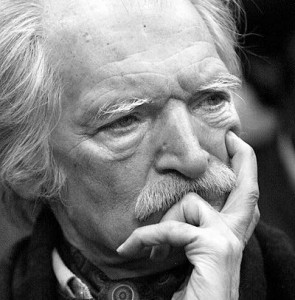 Born in 1940, Mahmoud Dowlatabadi is among the most celebrated authors in Iran. His works include the ten-volume epic “Kalidar,” “Ja-ye Khali-ye Solooch,” and “Roozegar-e Separi Shodeye Marde Salkhordeh.” Dowlatabadi began his artistic work as a theater actor and playwright. He is active in Iranian politics, having supported Mir Hossein Moussavi during his 2009 election campaign. Dowlatabadi’s most recent novel, “Colonel”, was published in Germany last year but has not yet received a publication permit in Iran.
Born in 1940, Mahmoud Dowlatabadi is among the most celebrated authors in Iran. His works include the ten-volume epic “Kalidar,” “Ja-ye Khali-ye Solooch,” and “Roozegar-e Separi Shodeye Marde Salkhordeh.” Dowlatabadi began his artistic work as a theater actor and playwright. He is active in Iranian politics, having supported Mir Hossein Moussavi during his 2009 election campaign. Dowlatabadi’s most recent novel, “Colonel”, was published in Germany last year but has not yet received a publication permit in Iran.
“I believe that war is one of the maladies of the human community; in the case of a potential war between Iran and the US, I believe the relations between the two countries will be ruined forever.”
“I witnessed eight years of war with Iraq, which had no good coming out of it. Many writers were forced to leave Iran or became depressed and isolated. I don’t have a good experience from war.”
“I believe we writers can write more freely in Iran and publish our books if there is peace in the world. During a war, all conditions are compulsory, and in fact the government finds excuses to prevent cultural activities. I believe that with a war, the conditions for writers and artists not only do not improve; they get a lot worse.”
“I hope that the reforms in Iran continue to move forward and create change in conditions, so that our country is not constantly in a state of contradiction with the rest of the world. This is my personal wish.”
Majid H. | Student Activist
Majid H. is a student activist who was arrested after the 2009 presidential election and spent several months in prison. He is a member of the nationwide reformist and pro-Green Movement student organization, Daftar-e Tahkim-e Vahdat. After receiving repeated summonses to appear at the Ministry of Intelligence, he has gone into hiding. He interviewed with the Campaign on condition of anonymity due to security concerns and fear of reprisal from judicial authorities.
“[An attack] would result in destruction of the country’s infrastructure and would be a huge setback for the people, a bitter experience that would destroy any present achievements. [The wars in Iraq and Afghanistan] not only did not achieve their stated goals, but resulted in further destruction. It is particularly heart-wrenching to witness the developments in Afghanistan. In Iraq, although the country was freed from [Saddam Hussein’s] dictatorship, following the American attack, the daily cost of it is not acceptable. Any rational mind would seek a less costly and surer way of achieving democracy. Any war takes the humanity out of humans. [A conflict] would change the social and political environment of the country in the worst possible manner.”
“Our people today are closer than ever in achieving historical goals such as a broad understanding of rights and freedoms, and an understanding that having opposing views is possible. Respect for one’s opinions and creed and tolerance of differences are concepts that are widely taking root among the young generation. This is providing the grounds for united actions to demand respect for these from the state too, such as in the form of protests in the last couple of years. It is a manifestation of a collective consciousness and spirit. Having paid a heavy price standing up and fighting religious fundamentalism, reactionary thoughts, and monarchic dictatorship to reach this point, would it not be ironic to welcome war and provide further opportunity for enemies of human rights and democracy? To provide for an uncertain and complicated situation?”
Sadeq Zibakalam | Professor
 Born in 1948, Sadeq Zibakalam is a researcher, political analyst, and a faculty member at Tehran University. Zibakalam holds a Ph.D. in Political Science from Bradford University in the United Kingdom. He has published dozens of books, some of which are used as textbooks in Iranian universities. Zibakalam is one of Iran’s leading public intellectuals known for his cutting analysis and opinions on Iran’s domestic and international affairs. Consequently, broadcast media outlets consistently seek him out as an expert in the field.
Born in 1948, Sadeq Zibakalam is a researcher, political analyst, and a faculty member at Tehran University. Zibakalam holds a Ph.D. in Political Science from Bradford University in the United Kingdom. He has published dozens of books, some of which are used as textbooks in Iranian universities. Zibakalam is one of Iran’s leading public intellectuals known for his cutting analysis and opinions on Iran’s domestic and international affairs. Consequently, broadcast media outlets consistently seek him out as an expert in the field.
“First of all, a military strike will not help the democracy and reformist movement at all because it will cause militarization of the country. The military and Revolutionary Guards will increase their power and radical elements on the conservative right will be strengthened. All of these will seriously harm the movement for greater freedoms. An attack will seriously harm the reformist and democracy movements in Iran, providing a pretext for the government to increase its pressure on them.”
“On the other hand, chaos and instability following a military strike, could lead to occupation of certain parts of the country and cause a civil war and even disintegration. If Arab countries become the allies of Western powers and the United States in such a confrontation, we can see serious problems in border provinces such as Khuzestan, Sistan and Baluchistan, Kurdistan, and Azerbaijan. Furthermore, attacking nuclear installations will certainly cause a chain reaction. Most importantly is that Iran’s reaction will be to attack American military bases in the region, regardless of how successful it might be. If an attack is initiated by Israel, Iran will order (Lebanese) Hizbollah to attack Israel and then Israelis will expand their military campaign (into Lebanon).”
“If the US attacks Iran, an implicit alliance between Iran, Al-Qaeda, and the Taliban will be formed based on the logic that ‘my enemy’s enemy is my friend.’”
Shirin F. | Environmental Activist
Shirin F. is an Iranian civil society and environmental activist . Over the past 13 years she has been active in the Iranian civil society and participated in environmentalist projects carried out by various NGOs. With the presidency of Mahmoud Ahmadinejad and increasing governmental hostility towards NGOs, her organization lost a number of its projects. Intelligence officials interrogated her consistently after she returns from international conferences on environmental issues. Shirin F. agreed to be interviewed on condition of anonymity.
“As someone who spent much of my childhood and adolescence during [the Iran-Iraq] war, I can never be favorable towards a war scenario. During the war, people struggled just to stay alive. This may strengthen social solidarity but it also results in a depressed society when no one thinks of building anything.”
“If someone was involved in social activism [during the Iran-Iraq war], they would be called ‘comfortable’ and ‘without pain.’ It took many years for such activists to find and legitimize their work and concerns throughout towns, cities, and institutions. A new war would be a great setback. It will remove us much further from democracy, civil society, and social activism. People will be the main losers of such a war.”
“Those [countries] who advocate war in today’s political climate, are those who consider themselves the flag bearers of democracy and human rights. What kind of human rights framework allows countries to decide war or peace for the people of another nation? They will cause war, then assign reconstruction budgets, build local armies, all for bringing peace to another nation. No lasting peace is achieved through foreign intervention.”
Mohammad Ali Sepanlou | Poet
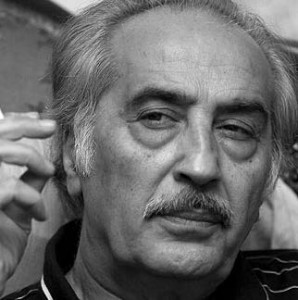 Born in 1940, Sepanlou is a poet, translator, and literary critic and one of the most renowned contemporary poets in Iran. He has translated the works of world famous writers into Persian, including Albert Camus and Jean Paul Sartre. He began writing in the 1960s and was a founding member of the Iranian Writers’ Association. In the past 20 years, Sepanlou has been among a handful of poets who have participated in conferences in Europe and the United States and whose work has been translated into multiple languages, including English, German, French, and Arabic. Several of Sepanlou’s poetry collections have been denied publication permits by Iran’s Ministry of Culture and Islamic Guidance.
Born in 1940, Sepanlou is a poet, translator, and literary critic and one of the most renowned contemporary poets in Iran. He has translated the works of world famous writers into Persian, including Albert Camus and Jean Paul Sartre. He began writing in the 1960s and was a founding member of the Iranian Writers’ Association. In the past 20 years, Sepanlou has been among a handful of poets who have participated in conferences in Europe and the United States and whose work has been translated into multiple languages, including English, German, French, and Arabic. Several of Sepanlou’s poetry collections have been denied publication permits by Iran’s Ministry of Culture and Islamic Guidance.
“I thought a lot about war with Iran, and every time I opposed it because more than anything else it will hurt the people of Iran. First of all, any war that could take place would not be a short-term war, and secondly, the instinct to defend and the nationalism of the Iranian people would come into play, and assuming that the country’s rule changes, it will be followed by a civil war which would also hurt the people of Iran.”
“A war would not serve US interests, as Iranians are the only people among the Islamic countries of the Middle East who have a favorable view of Americans. Unlike the Shah’s time when Iranians were against the United States, they have no animosity toward the United States right now. If any blood were shed between the two countries, it would be to both countries’ disadvantage. We do not wish to see another Iraq here, where everyday a car bomb could go off. Nobody can predict the results of a war and say what would happen after a war; therefore I oppose a war one hundred percent.”
“Even the situation of literature is unpredictable during a war and following a war. War casualties would lead poets into becoming the elegy writers of their country.”
Keyvan P. | Journalist
Keyvan P. is a journalist and blogger for ten years. He was arrested during the aftermath of the 2009 presidential election. He lost his job after the 2009 election when authorities shut down many reformist newspapers. He interviewed on condition of anonymity for security reasons.
“During [the Iran-Iraq war], the press had no ability to reflect what was happening inside prisons, either domestically or on the international level. This scenario could very well be repeated if a new military situation arises. Many prisoners who hold on to their beliefs in opposing the Islamic Republic could be executed.”
“Today there are many forms of alternative media, such as those empowered by the Internet, but due to government control, they won’t have much impact inside the country and may only inform the outside world in a limited way. The bulk of the population would be under the grip of government propaganda and will not know of large numbers of executions or widespread torture inside prisons. Under a military crisis, all security related sentences would urgently be implemented and no form of civil action or movement be tolerated. This has been demonstrated in a limited way during the post-election events of the last couple of years.”
“In general, [war] will be disadvantageous because the government will increase censorship in order to preserve itself. It’s even possible that they will set up a system to filter all sources of information. For example, it’s possible that domestic media outlets will be required to be checked by a government agent before going to publication. [War] will increase censorship in Iran and create a tool for repressing journalists.”
Lili Golestan | Author
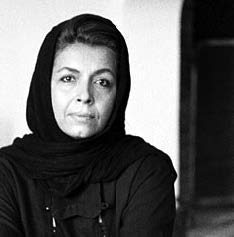 Born on 14 July 1944, Lili Golestan is a literary translator, author and owner and artistic director of the well-known Golestan Art Gallery. She is the daughter of the renowned Iranian filmmaker and writer, Ebrahim Golestan. In 1981, Golestan opened a bookstore in the garage of her home, which soon became a well-known meeting place of great writers and poets of the era, such as Ahmad Shamlou, Mohammad Zohari, Ahmad Mahmoud, Ali-Akbar Sa’idi Sirjani, and Abdolhossein Navaei. In 1988, she converted the bookstore into the visual arts gallery, Golestan Art Gallery, which has showcased the works of some of the most celebrated Iranian and international artists.
Born on 14 July 1944, Lili Golestan is a literary translator, author and owner and artistic director of the well-known Golestan Art Gallery. She is the daughter of the renowned Iranian filmmaker and writer, Ebrahim Golestan. In 1981, Golestan opened a bookstore in the garage of her home, which soon became a well-known meeting place of great writers and poets of the era, such as Ahmad Shamlou, Mohammad Zohari, Ahmad Mahmoud, Ali-Akbar Sa’idi Sirjani, and Abdolhossein Navaei. In 1988, she converted the bookstore into the visual arts gallery, Golestan Art Gallery, which has showcased the works of some of the most celebrated Iranian and international artists.
“When civilized nations can engage in dialogue to address their differences, there is no justification for barbaric actions such as war. It would not result in any positive developments and will bring about the deaths of many innocent civilians as well as chaos and anarchy.”
“I don’t believe problems regarding Iran can be solved with a military attack at all. Look at Iraq. The United States wanted to solve its problems with war, but has that been achieved? Unfortunately, the United States has failed in this effort and regarding Iran, the military option must be completely discarded.”
Natasha Amiri | Author
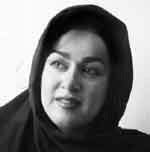 Amiri is a writer, literary critic, and the author of several novels such as “Eshgh Rooye Chakraye Dovvom,” and “Hoola…Hoola.” She has received several literary awards, including Sokhan.com’s award for Best Popular Story for “Aan Keh Shabih-e to Nist,” on the occasion of famed author Sadegh Hedayat’s 100th birthday. She has also received numerous awars in Iran, including first prize from the literary magazine Asr-e Panjshanbeh and the Iranian People’s Prize for her debut novel “House of Stories”.
Amiri is a writer, literary critic, and the author of several novels such as “Eshgh Rooye Chakraye Dovvom,” and “Hoola…Hoola.” She has received several literary awards, including Sokhan.com’s award for Best Popular Story for “Aan Keh Shabih-e to Nist,” on the occasion of famed author Sadegh Hedayat’s 100th birthday. She has also received numerous awars in Iran, including first prize from the literary magazine Asr-e Panjshanbeh and the Iranian People’s Prize for her debut novel “House of Stories”.
“I believe that we who live inside of Iran have a more accurate view of Iranian society. In my opinion, discussing the military option, given Iran’s current regional situation, is odd; especially after the sanctions imposed on Iran. Meaning, it is unlikely that immediately after imposing sanctions that the military option will be chosen. As a writer who hears outsiders’ criticism, I feel that their analysis is far from reality because they have no contact with the Iranian people. Being inside the country, I believe that our people are not ready for war and view war as foreign intervention. Maybe in three months the situation will change.”
“A lot of people inside Iran may be unsatisfied, but they are not willing to choose just any option to change their situation. They are much more aware than the pre-revolution era. After all, we have been through a revolution. My question is: after a war will our situation be like Iraq? I went to Iraq after the Iraq war and their condition was not desirable. I would not want that for my country.”
Ramin G. | Lawyer
Ramin G. is an active human rights lawyer. Last year, authorities arrested and sentenced him to prison after he represented a number of human rights abuse victims. Despite pressure from authorities to stop his activities, Ramin G. continues to speak to national and international media about his cases in order to raise public awareness and mobilize support for his clients . He continues his work under very difficult circumstances, repeatedly receiving threats from judicial authorities. Ramin G. interviewed with the Campaign on condition of anonymity.
“Standing up to America has been instrumentally used to whip up the emotions of [the regime’s] base and bring them into the streets for years. They publicly state that [the United States] is the country’s main concern and this idea has become an unconscious belief for many people, both supporting and opposing the state. In event of a war, such sloganeering would move into the realm of reality. Any opposition to the government would be considered siding with [US] imperialism. In practice, many opposition sympathizers could end up in the government’s camp, leaving the remaining opposition forces few and inactive. They will be seen as taking the foreign aggressor’s side, making it easy to label them the enemy’s fifth column and providing a justification for their repression.”
“The crisis stemming from a military confrontation would significantly lower the level of people’s expectations from the state because the people would have to choose between a ‘bad’ situation, meaning the rule of a dictatorial system and related hardships, versus a ‘worse’ situation, that would entail loosing national independence and sovereignty. The majority would prefer to choose the ‘bad’ option over the ‘worse.’ Under a military situation, violence and its consequences would spread throughout society, but its implementation would remain hidden from the public eye. The government could use the situation to settle political scores on a wide scale to eliminate its opposition. In parallel to violence unleashed during a war, the rule of law and a minimum respect for its standards and people’s rights would be completely ignored. War is a good instrument for whipping up the society’s nationalistic emotions and abusing them for the purpose of covering up the failings of the state.”
“Religious rulers, in general, would portray any military confrontation with their enemies as a sacred battle of the Righteous and struggle against the Infidels and would propagate it as such. Under such views, there is no doubt that that the State’s attempts to develop nuclear arms would become a clear strategic goal. Such thinking would unfortunately be strengthened even in event of a military failure and setback for it, and would result in suicidal movements and widespread assassinations of dissidents inside the country and especially abroad. It is under such circumstances that the international community would be hard pressed with regard to options available to it. Because such a political system, in addition to the usual tools at their disposal, also enjoy a cultural, religious, and populist base amongst certain layers of the society and would use it to whip up religious emotions and abuse religious beliefs as a weapon and defensive shield, which will not be limited to the Iranian people and could spark a broad crisis throughout the Muslim populations of the region.”
“As the freedom-seeking movement inside the country continues to develop and grow and the State’s weakness in confronting it reveals itself, as well as the inherit contradictions of the system. The emergence of a foreign military confrontation, more than being a necessity for the United States and the West, would be in line with the desires of the ruling class because the government can use the situation to unify its fragmented forces and solidify itself.”
“It is the people who will carry the burden, both in the short and long-term. And the ruling class, by increasing its repression and pressures, will preserve itself. Ultimately a military attack does not impact the government’s grip on power.”
Hassan B. | Student Activist
Hassan B. is a student rights activist who was arrested after the 2009 presidential election. The Campaign conducted the interview while he was released on a short furlough from prison. Hassan B. is one of the most vocal student activists advocating against the violence used towards Iranian citizens in the aftermath of the 2009 election. He agreed to be interviewed on condition of anonymity.
“If war breaks out, democracy, human rights, and civil society will be the main losers. The Iranian government would militarize and such a militaristic government has the potential to carry out widespread killings of its opponents, such as what happened in Iraqi Kurdistan or against Shi’as in the South of Iraq [under Saddam’s rule]. Human rights crimes will be at their zenith.”
“The only way forward is through negotiations. So far we haven’t seen any serious negotiations in the region that benefits the people. We have witnessed a series of wars, such as in Afghanistan or Iraq, or crippling sanctions against Iraq under Saddam that led to the Oil for Food program.”
“Economic sanctions will harm the people most because the government has oil revenues. For example, the Revolutionary Guard controls as many as 1000 companies that are based in the UAE and carry out their business from there. Sanctions will bring a crisis for the people and not them.”
Shadmehr Rastin | Screenwriter
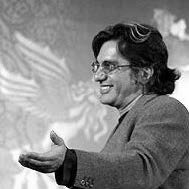 Born in 1964, Shadmehr Rastin is one of Iran’s most famous screenwriters having written the scripts for “Be Hamin Sadeghi” directed by Reza Mirkarimi, and “Offside!” directed by Jafar Panahi. “Be Hamin Sadegi” won the award for Best Script at the 26th Fajr Film Festival. The film was shown at film festivals in Chicago, Moscow, Hamburg, and Portland, receiving the award for Best Film at the Moscow International Film Festival.
Born in 1964, Shadmehr Rastin is one of Iran’s most famous screenwriters having written the scripts for “Be Hamin Sadeghi” directed by Reza Mirkarimi, and “Offside!” directed by Jafar Panahi. “Be Hamin Sadegi” won the award for Best Script at the 26th Fajr Film Festival. The film was shown at film festivals in Chicago, Moscow, Hamburg, and Portland, receiving the award for Best Film at the Moscow International Film Festival.
“On the off-chance that the Americans were to make such an unwise decision and attack Iran, a situation similar to the American-led coup 50 years ago [in 1953] will happen in Iran again and the United States’ image will be more tarnished than ever for Iranians. Iran has a civil society, something that didn’t exist in any of the other countries where US attacked. The US attack may have helped the people of those countries to reach their civil demands, but in Iran people express their demands in modern ways.”
“Any government anywhere in the world that does not have regard for its people needs an external enemy for unity. This is the case all over the world. Maybe for the US government, this is space aliens, and for the Iranian government, it is the US. Many politicians use this alternative. It appears that under the present circumstances, our politicians think about the war a lot, and it seems that this is their number one alternative now. I am very concerned that under the existing circumstances, in order to bring unity between the nation and the government, this alternative may be chosen. I hope that this lack of wisdom does not develop in Iran.”
Alireza K. | Journalist
Alireza K. is a well-known political journalist who has previously written for reformist newspapers. Due to his activism he has been imprisoned, arrested, and interrogated by security forces. During his 15 years of work as a journalist, on a number of occasions he has been forced to change jobs due to the government banning reformist newspapers. He agree to speak to the Campaign on condition of anonymity for security reasons.
“Before the 2009 election, most reformists and moderates feared a military confrontation with the United States and considered it not only against the interests of the general public, but also against the interests of the reformist camp who wanted to bring about fundamental changes from within the system. But today, many reformists and moderates are of the belief that the Islamic Republic is not amenable to gradual change and engaging it on a reformist path is not possible. Thus, if they previously opposed a limited military strike, today, if not welcoming it, they may not oppose it. But is this option in the interests of the population? No. The Iranian people have a collective culture. They try to depict an image of a cohesive society so when tragedy strikes they can become united and overcome the obstacles. The people of Iran are like a field of wheat. They stand together, and when a powerful wind blows they bend. They even bend to the point of hitting the ground, but they do not break. They take refuge in one another until the storm passes, and then they regain composure and live on. This is why foreign government’s pressures have not worked on them. Not only have they have not worked, but rather they have strengthened their bonds. We should distinguish between the Iranian people and their government. [In the case of a military strike] people will gravitate towards unifying behind the government. All means of communication are in the hands of the government. They utilize religion and religious principles effectively to guarantee the survival of the regime, and strengthen the opposition against the United States. They create a duality of good and evil. They portray the survival of the country as being tied to the survival of the regime.”
Back to Main———————————————Continue Part II




